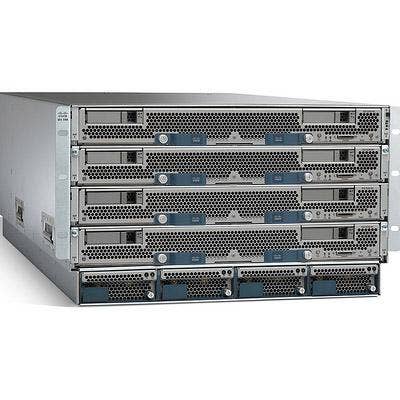Burning Questions For Cisco's Channel Chiefs
Men In Charge
From Unified Computing System (UCS) to the Tandberg acquisition, the collaboration roadmap and that pesky rivalry with HP, Cisco's top channel executives certainly have a lot to talk about. During an executive press briefing at the Cisco Partner Summit in San Francisco this week, Keith Goodwin, (opposite left), senior vice president of worldwide channels, and Edison Peres, (opposite right), senior vice president of worldwide channels go-to-market, offered some perspective. Here's a look at some of their choice words.

Cisco Vs. HP
BURNING QUESTION: The rivalry with HP is seen to be hurting some partners, especially those who had to choose between attending HP's and Cisco's partner conferences this week. What is Cisco's message to those partners?
KEITH GOODWIN: Competition is a great thing and makes us all better. Our partners have a choice. Our view is very simply, how can we help them to grow with us both from a top line and bottom line perspective? The partners will evolve. Are they going to have to make choices? Perhaps.

Cisco In The Data Center
BURNING QUESTION: What makes Cisco more equipped than its rivals to offer best-in-class data center solutions?
KEITH GOODWIN: Let's go back to when Cisco went into voice. It [the question] was, 'What does Cisco know about voice? You guys are a networking company.' We took traditional telephony and voice as an application on the network. We're focused on significant market transitions that leverage our technology and leverage our platform. That is the common thread. It's not about moving into the data center and selling servers like everyone else does.

Cloud Architecture
BURNING QUESTION: How does cloud architecture fit into Cisco's current partner classifications for architecture?
EDISON PERES: The appetite of the market (cloud) has been reflected in the growth of managed services, which is one manifestation of a kind of cloud-based services.
KEITH GOODWIN: The virtualized data center enables cloud computing. But the cloud-based services, with everything coming as a service, is itself a new consumption model.

Tandberg Margin Pressure
BURNING QUESTION: Won't Cisco's acquisition of Tandberg place margin pressure on existing Tandberg VARs now that Tandberg products will be available to the broader Cisco channel?
EDISON PERES: We're going to continue to run in parallel. The discounting reality in the Tandberg world is different than the one in the Cisco world. If we brought Tandberg in today with our discounting reality it would have a negative effect. We are changing our systems, and trying to be very deliberate by being cautious on margins. We're working on formal certifications with a commitment that makes sense.

Supply Chain Woes
BURNING QUESTION: Given Cisco's supply chain issues throughout the past year, is there more Cisco could have done to articulate what was wrong and how it would be fixed to partners?
KEITH GOODWIN: More communication is always better. We have to be careful about what we say because it can be relevant to the financials and material to the financials, so there's a little bit of a trade-off. But our goal is to be as transparent as possible.

The Lucky 500?
BURNING QUESTION: Who are the 500 customers that Cisco identified as "transformational accounts" -- large, complex, requiring special attention -- at Partner Summit this week?
KEITH GOODWIN: The 500 we identified are enterprise. We haven't published that list yet and are in the process of naming them.

Changing Targets
BURNING QUESTION: Is that list of 500 dynamic? Will it change over time?
EDISON PERES: Everything is dynamic in life, nothing is firm. It's not a list that changes every day but really more of a multi-year journey with these customers.

Privileged Access?
BURNING QUESTION: Cisco on Tuesday announced a new services specialization through which partners can become services specialized and then become preferred partners to work with Cisco on the 500 transformational accounts. Aren't you in essence asking partners to pay for privileged access?
EDISON PERES: No. One of the elements of specialization is that there's a level of networking visibility here that partners with certain experience create. All we're doing is we need to be able to work with certain partners to give us that visibility. The intent is not to give them access, but to enable that partner to brand such that we know who they are and that they can provide this.